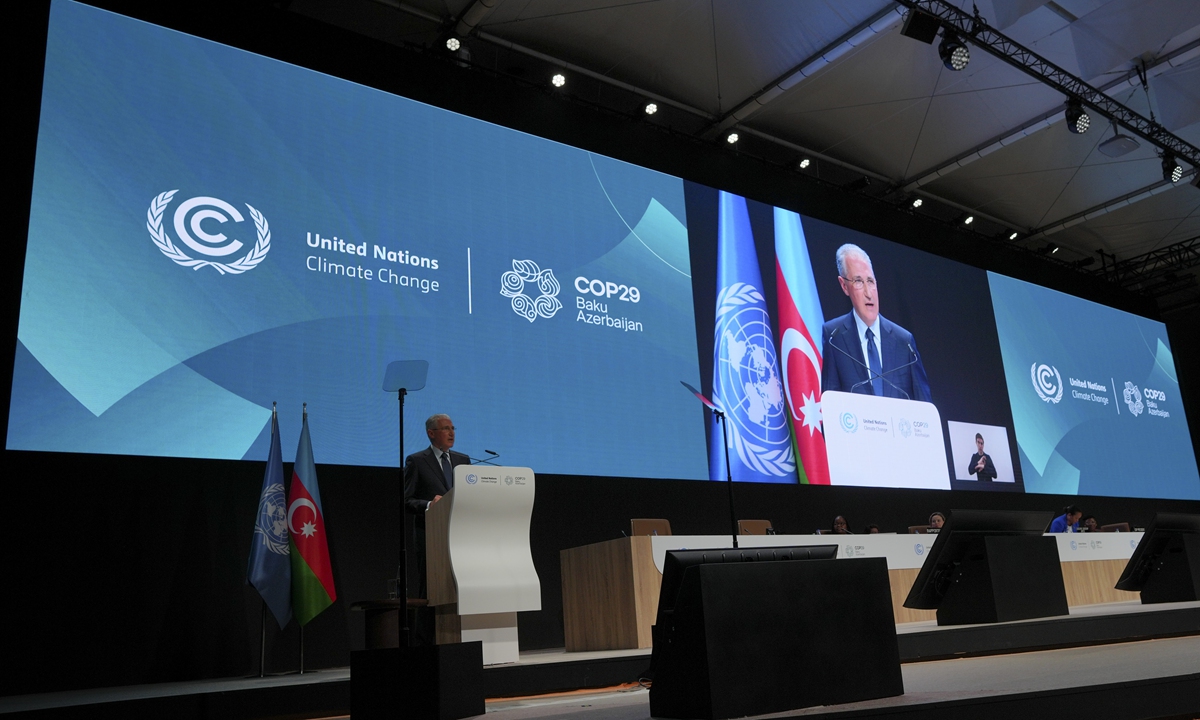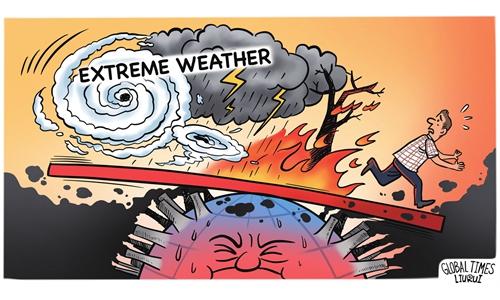COP29 opens to discuss efforts tackling global warming after deadly climate-related disasters

Mukhtar Babayev, COP29 President, speaks during the opening plenary session at the COP29 U.N. Climate Summit, Monday, Nov. 11, 2024, in Baku, Azerbaijan. Photo: VCG
With memories of deadly floods in Spain and severe hurricane strikes in the US still fresh, and the summer of 2024 being the hottest on record, world leaders, scientists and industry representatives are gathering in Baku, Azerbaijan for the COP29 to discuss concerted efforts to respond to climate change.
However, the latest changes in the international landscape, including Donald Trump's reelection as US president given the fact that he had pulled the US out of the Paris Agreement in his first term, and emerging protectionism over green technologies, have brought uncertainty to the event.
Making emission reduction plans and a climate funding arrangement are high on the agenda this year, Chinese analysts said, stressing that the imminent threat posed by climate change to humanity is a bugle call for countries to take more proactive measures, and developed countries should fulfill their commitment rather than shun responsibilities.
Imminent threat
The COP29, formally known as the 29th session of the Conference of the Parties to the United Nations Framework Convention on Climate Change (UNFCCC), is slated to be held in Baku from November 11 to November 22.
Browsing news websites, examples of extreme weather victims and climate refugees are abundant. Simon Stiell, Executive Secretary of the UNFCCC, said on Monday's COP29 opening that "This crisis is affecting every single individual in the world in one way or another."
Stiell urged parties to dispense with any idea that climate finance is charity. "An ambitious new climate finance goal is entirely in the self-interest of every nation, including the largest and wealthiest."
According to the Intergovernmental Panel on Climate Change, a UN body, in 2022, limiting warming to around 1.5 C requires global greenhouse gas emissions to peak before 2025 and decrease by 43 percent by 2030 to prevent irrevocable damage.
The deadline is around the corner.
In an interview with the Guardian on Friday, UN Secretary-General Antonio Guterres said the world is still underestimating the risk of catastrophic climate breakdown and ecosystem collapse.
Humanity is approaching potentially irreversible tipping points such as the collapse of the Amazon rainforest and the Greenland ice sheet as global temperatures rise, Guterres said, warning that governments are not making the deep cuts to greenhouse gas emissions needed to limit warming to safe levels.
Ma Jun, director of the Beijing-based Institute of Public and Environmental Affairs, told the Global Times the lessons that should be learned from more frequent natural disasters are not only emergency response capacity building for nations, but also the importance and urgency of emission reduction.
Countries must take more proactive measures to reduce emissions in order to avoid further increases in global temperatures, which could lead to more severe climate consequences, Ma noted.
Looming challenges
Politico said in a Sunday report that "the world is bracing for Trump to withdraw the US from the Paris climate agreement for the second time."
The Trump campaign told Politico in June that the former president would quit the global pact, as he did in 2017 during his first stint in the office. Trump has not yet issued his policy on climate change since winning the election.
The US is the biggest developed country, with many allies and great influence on global governance, and its potential withdrawal from the agreement again will undoubtedly backpedal global efforts for carbon reduction and climate change response, Xin Qiang, director of the Taiwan Studies Center at Fudan University, told the Global Times on Monday.
The US' swinging back and forth in its climate stance not only means discontinuity in domestic policy on clean energy and carbon reduction, but also jeopardizes global cooperation and joint action, Xin said.
Another challenge is the emerging protectionism related to green industries, such as new-energy vehicles (NEVs) and photovoltaic panels, according to Lü Xiang, research fellow at the Chinese Academy of Social Sciences.
Some countries in the EU have resorted to tariffs primarily for economic reasons, but they should recognize that such protectionism is detrimental to green technology transfer and global climate cooperation, Lü said.
A key task of the COP29 is to establish a New Collective Quantified Goal on climate financing, which represents a post-2025 climate financing commitment from developed economies to developing nations, Xia Yingxian, director of the Ministry of Ecology and Environment's Department of Climate Change, said at a news conference on Friday.
The new financing arrangement is set to replace developed countries' $100 billion annual commitment as per the Paris Agreement. The commitment was not truly fulfilled and will expire in 2025.
Climate finance, as a focal point, hot spot and challenge in the international climate process, is crucial for building trust between developed and developing countries, and it is key to advancing multilateral progress, Xia said.
China's role
At the invitation of President of Azerbaijan Ilham Aliyev, President Xi Jinping's Special Representative, Member of the Standing Committee of the Political Bureau of the CPC Central Committee and Vice Premier of the State Council Ding Xuexiang will travel to Azerbaijan from November 12 to 13 for the World Leaders Climate Action Summit and visit the country at the invitation of Deputy Prime Minister of Azerbaijan Shahin Abdulla oglu Mustafayev, according to Chinese Foreign Ministry.
Chinese Foreign Ministry spokesperson Mao Ning said at Friday's routine press briefing that China stands ready to work with other parties to uphold the goal, principles and system of the UNFCCC and the Paris Agreement, advance practical actions and achieve sustainable development. China hopes to see positive outcomes on the global climate finance goal at the meeting, Mao said.
Developed countries should earnestly fulfill their responsibilities and provide strong financial support to developing countries for their climate response. China will continue to offer assistance to fellow developing countries to the best of its capacity under the framework of South-South cooperation, said the spokesperson.
Some countries have been pressing China to contribute more funding, but Ma noted China's consistent stance is "shared but differentiated responsibilities."
Data show that from the beginning of the Industrial Revolution in the mid-18th century to 1950, developed countries emitted 95 percent of the world's total carbon dioxide, and from 1950 to 2000, the emissions produced by developed countries accounted for 77 percent of the global total, Xinhua reported.
The COP29, and the overall climate change response, should be practical and respect different countries' efforts based on their national conditions, Ma said.
Xin Qiang said China has always been a responsible major power in dealing with climate change: in addition to continuous afforestation, it has invested enormously in green transition and helps other developing countries in the cause.
China released an annual climate action report on November 6, outlining the country's new initiatives for tackling climate change. According to the report, China's energy use structure, manufacturing, transportation and construction have been greener in the past year.
As for global cooperation, China has signed 52 South-South cooperation documents on climate change with 42 developing countries, per the report.
China's wind power and photovoltaic product exports helped other countries reduce carbon dioxide emissions by about 810 million tons in 2023, according to the white paper issued by China's State Council Information Office in August, Xinhua reported.

